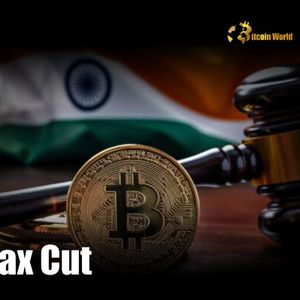Hope Rises: Indian Crypto Industry Pushes for Tax Cuts Amid Shifting Government Stance
4 min read
BitcoinWorld Hope Rises: Indian Crypto Industry Pushes for Tax Cuts Amid Shifting Government Stance The landscape for digital assets in India is constantly evolving, and right now, a significant shift might be underway. The Indian crypto industry is actively engaging with the government, hoping to secure crucial tax relief that could redefine the future of cryptocurrency trading in the nation. Why is the Indian Crypto Industry Lobbying for Change? For a few years now, the crypto sector in India has operated under a stringent tax regime implemented in 2022. This policy included a flat 30% tax on capital gains from crypto assets and a 1% Tax Deducted at Source (TDS) on every single transaction, regardless of profit or loss. The intention behind these measures was reportedly to deter illicit activities and bring clarity to the nascent sector. However, the industry quickly felt the pinch. The high tax burden, particularly the 1% TDS, made frequent trading significantly more expensive. This led to a dramatic exodus of trading volume from Indian exchanges to offshore platforms. Research by the Esya Centre highlighted this challenge, estimating that over 90% of Indian crypto trades migrated away. This outflow meant reduced revenue for Indian businesses, fewer opportunities for local innovation, and potentially less visibility for regulators into actual trading activity. What are the Proposed Changes to India Crypto Tax ? Industry leaders are not asking for a complete removal of taxes but rather a more balanced approach. A key proposal is to significantly reduce the Transaction Tax (TDS) from 1% to a much lower rate, perhaps 0.1%. Executives like Ashish Singhal, co-founder of the prominent Indian exchange CoinSwitch India , argue that a 0.1% TDS would still serve the government’s goal of tracking transactions effectively without placing an excessive burden on traders. A lower rate could incentivize users to return to regulated Indian platforms, providing regulators with better oversight. Is the Government’s Stance on Crypto Regulation India Softening? Reports suggest that there is indeed a more favorable environment emerging for dialogue between the government and the crypto sector. Industry executives have noted increased willingness from regulators to engage and understand the nuances of the digital asset space. This contrasts with previous periods where the official stance appeared more cautious or even skeptical. Several factors might be contributing to this potential shift: Global Trends: Many major economies are moving towards clearer regulatory frameworks rather than outright bans or punitive taxes. India might be observing these international developments. Industry Dialogue: Persistent engagement and education efforts by the Indian crypto industry seem to be bearing fruit, fostering better understanding among policymakers. Changing Geopolitical Landscape: Some reports suggest that the pro-crypto stance of global leaders, such as former U.S. President Donald Trump (mentioned in the original report), could indirectly influence perceptions and approaches internationally, including in India. While no concrete policy changes have been announced, the fact that regulators are reportedly engaging more closely with industry representatives like those from CoinSwitch India is seen as a positive sign. What Does This Mean for the Future of Crypto Tax India ? The ongoing lobbying efforts represent a critical juncture for the Indian crypto market. A reduction in the transaction tax could have several positive outcomes: Bring Trading Back: A lower TDS could encourage traders who moved offshore to return to Indian exchanges, boosting liquidity and volume on regulated platforms. Boost Innovation: Increased activity and clearer rules could foster innovation within the domestic crypto and blockchain ecosystem. Increase Government Revenue: While the TDS rate would be lower, a higher volume of transactions on regulated platforms could potentially lead to greater overall tax collection from other sources like capital gains (though the 30% CGT remains a point of discussion). Improved Regulatory Oversight: Having trading activity concentrated on domestic, regulated exchanges provides regulators with better tools for monitoring and preventing illicit activities. The challenges remain significant. The government needs to balance the industry’s demands with its concerns about financial stability, investor protection, and preventing misuse of digital assets. However, the reported shift towards more open dialogue offers hope for a more balanced and pragmatic approach to crypto regulation India . Conclusion: A Glimmer of Hope for India’s Crypto Future The push by the Indian crypto industry for tax relief is gaining momentum, coinciding with what appears to be a more receptive government ear. The current high taxes, particularly the 1% TDS, have undeniably hindered domestic trading activity, pushing it towards less regulated offshore markets. Industry proposals, such as reducing the TDS to 0.1%, aim to strike a balance between effective tracking and fostering a healthy domestic market. While the path forward involves complex discussions around India crypto tax and broader crypto regulation India , the increased engagement between regulators and platforms like CoinSwitch India signals a potential turning point. Stakeholders across the board are watching closely, hoping that these dialogues will pave the way for policies that unlock the full potential of the digital asset space in India while addressing regulatory concerns. To learn more about the latest crypto market trends, explore our article on key developments shaping cryptocurrency institutional adoption. This post Hope Rises: Indian Crypto Industry Pushes for Tax Cuts Amid Shifting Government Stance first appeared on BitcoinWorld and is written by Editorial Team

Source: Bitcoin World



